
North Korean population is subjected to surveillance, mind control, and an unrelenting programme of organised absurdity.
North Korea
Continued.. 3/3
Defection
Since 1953, 100,000–300,000 North Koreans have defected, most of whom have fled to Russia or China. 1,418 were registered as arriving in South Korea in 2016. In 2017, there were 31,093 defectors registered with the Unification Ministry in South Korea, 71% of whom were women. In 2018, the numbers had been dramatically dropping since Kim Jong-un took power in 2011, trending towards less than a thousand per year, down from the peak of 2,914 in 2009.
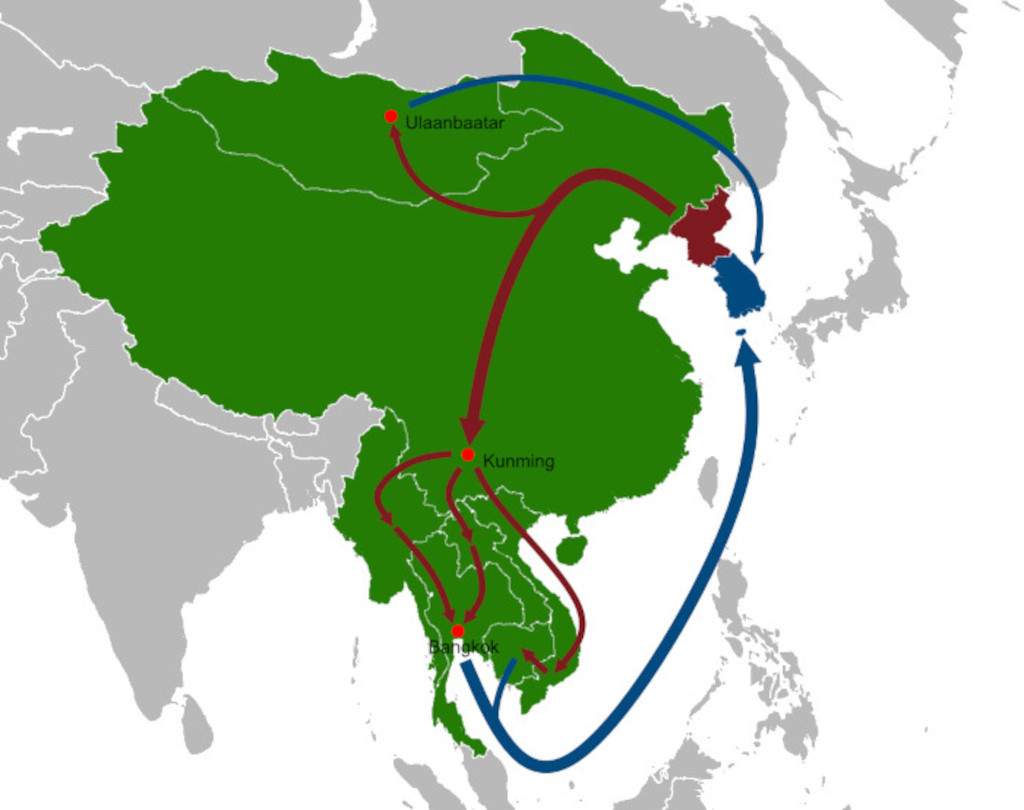
According to the State Department estimates, 30,000 to 50,000 out of a larger number of hiding North Koreans have the legal status of refugees. China does not grant asylum or refugee status to North Koreans and, with few exceptions, considers them undocumented migrants and deports them to back to North Korea. A 2009 world refugee study found that around 11,000 North Korean refugees remained in hiding in China close to the North Korean border.
The People’s Republic of China returns all refugees from North Korea, treated as undocumented migrants, usually imprisoning them in a short-term facility. Women who are suspected of being impregnated by Chinese men are subjected to forced abortions; babies born alive are killed. Abortions up to full term are induced by injection; live premature babies or full-term newborns are sometimes killed, but more commonly simply discarded into a bucket or box and then buried. They may live several days in the disposal container. Human-rights organisations have compiled a list of hundreds of North Korean defectors repatriated by China. The list includes humanitarian workers, who were assassinated or abducted by North Korean agents for helping refugees.
More women leave the North because they are more likely to suffer financial hardships. This is due to the prevalence of women in service sector jobs whereas men are employed in the military. According to South Korean government data, 45% of defectors cited economic reasons for defecting. According to NK News, men had a higher tendency to leave the country due to political, ideological or surveillance pressure. In the first half of 2018, women made up 88% of defectors to the South. In some cases, defectors voluntarily return to North Korea. Double defectors either take a route through third countries such as China, or may defect directly from South Korea. From 2012 to 2021 the Unification Ministry had recorded 30 defector returns, but there were likely more unrecorded returns.
A former South Korean MP estimated that in 2012 about 100 defectors returned to North Korea via China. In one case, a double defector re-entered North Korea four times. North Korea under Kim Jong Un has allegedly started a campaign to attract defectors to return with promises of money, housing, employment, and no punishments. A foreign diplomat in Pyongyang said in 2013 that not all returning defectors are trucked to prison; they can instead be put on TV for propaganda purposes. According to unconfirmed reports, government operatives have contacted defectors living in South Korea and offered them guarantees that their families are safe, 50 million South Korean Won ($44,000), and a public appearance on TV.
It was reported in 2013 that North Korea had aired at least 13 such appearances on TV where returning defectors complain about poor living conditions in the South and pledge allegiance to Kim Jong Un. In June 2017, Chun Hye-sung, a defector who had been a guest on several South Korean TV shows using the name Lim Ji-hyun, returned to the North. On North Korean TV, she said that she had been ill-treated and pressured into fabricating stories detrimental to North Korea. In November 2016, North Korean website Uriminzokkiri aired an interview with three double defectors who complained that they had been treated as second-class citizens. In 2021, a survey by the Database Center for North Korean Human Rights and NK Social Research found that 18% of 407 defectors polled were willing to return to North Korea.
North Korean defectors experience serious difficulties connected to psychological and cultural adjustment once they have been resettled. This occurs mainly because of the conditions and environment that North Koreans lived in while in their own country, as well as inability to fully comprehend new culture, rules, and ways of living in South Korea. Difficulties in adjustment often come in the form of post-traumatic stress disorder (PTSD), which is essentially a mental disorder that develops after a person has experienced a major traumatic event. In the case of North Koreans, such traumatic events and experiences include brutality of the regime, starvation, ideological pressure, propaganda, political punishments, and so on.
According to a recent survey, about 56% of the North Korean defectors are influenced by one or more types of psychological disorders. 93% of surveyed North Korean defectors identify food and water shortages and no access to medical care and, thus, constant illness as the most common types of their traumatic experiences preceding PTSD. Such traumatic experiences greatly influence the ways North Korean defectors adjust in new places. Traumatic events are not the only reason why North Koreans experience difficulty adjusting to the new way of living. Woo Teak-jeon conducted interviews with 32 North Korean defectors living in South Korea and found that other adjustment difficulties that are not related to PTSD occur due to such factors as the defector's suspiciousness, their way of thinking, prejudice of the new society, and unfamiliar sets of values.
In many instances, North Korean defectors seem to be unable to easily adjust to the new way of living even when it comes to nutrition. According to research conducted by The Korean Nutrition Society, North Koreans used to consuming only small portions of food in North Korea daily, continue to exercise the same type of habits even when given an abundance of food and provision. Psychological and cultural adjustment of North Koreans to the new norms and rules is a sensitive issue, but it has some ways of resolution. According to Yoon, collective effort of the defectors themselves, the government, NGOs, and humanitarian and religious organisations can help make the adjustment process smoother and less painful.
There are around 1,400 North Korean refugees in Europe, identifing North Korean communities in Belgium, Denmark, Finland, France, Germany, Luxembourg, the Netherlands, Norway, Sweden and the United Kingdom. As of 2015, the largest North Korean community in Europe resides in New Malden, South West London. Approximately 600 North Koreans are believed to reside in the area, which is already notable for its significant South Korean community.
Defectors from North Korea are a key source of first-hand information for intelligence officers, scholars, activists, and journalists. While their testimony is considered valuable, there is growing skepticism about the veracity of their accounts. Often defectors are cited anonymously to protect their identities, which makes it difficult to verify their information. Moreover, defectors often have limited experience and are not experts on North Korea. For their part, when surveyed in 2017 by the National Human Rights Commission of Korea, many defectors complained that journalists had violated their right to privacy.
Felix Abt, a Swiss businessman who lived in the DPRK, argues that defectors are inherently biased. He says that 70 percent of defectors in South Korea are unemployed, and selling sensationalist stories is a way for them to make a living. He also states that the overwhelming majority of defectors come from North Hamgyong Province, one of North Korea's poorest provinces, and often have a grudge against Pyongyang and provinces nearby. he states that defectors in South Korea's resettlement process tailor their accounts over time to become less mundane and more propagandistic. He criticises journalists and academics for not being skeptical about even the most outlandish claims made by defectors.
Human Trafficking
A group called “A Woman's Voice International” alleged that the state forcibly drafts girls as young as 14 years old to work in the so-called kippŭmjo, which includes prostitution teams. The source used is unclear as to whether only adult kippŭmjo are assigned to prostitution or whether there is prostitution of children — other kippŭmjo activities include massaging and cabaret dancing. Claims were made that they are ordered “to marry guards of Kim Jong-il or national heroes” when they are 25 years old.
Before 2009, over 70% of female North Korean defectors were victims of human trafficking. Due to their vulnerability as illegal migrants, they were sold for cheap prices, around 3,000 to 10,000 yuan. Violent abuse started in apartments near the border with China, from which the women are then moved to cities further away to work as sex slaves. Chinese authorities arrest and repatriate these North Korean victims. North Korean authorities keep repatriates in penal-labour colonies (and/or execute them), execute the Chinese-fathered babies “to protect North Korean pure blood,” and force abortions on pregnant repatriates who are not executed.
Human Experimentation
Im Cheon-yong, a former officer in Pyongyang's armed forces, says mentally and physically disabled children are used as subjects in chemical weapons experiments in North Korea, a claim denied by the supporters of the communist nation. An officer in North Korea's special forces, Im had reservations about the nation in which he was living, and the regime that he served to the best of his abilities, but the “special training” he was required to undergo at a military academy in North Pyongan Province for the regime's elite troops helped to convince him that he needed to defect. “If you want to graduate from this academy, you need to learn how to confuse the enemy without revealing your forces, how to carry out assassinations, how to use chemical weapons and so on,”.
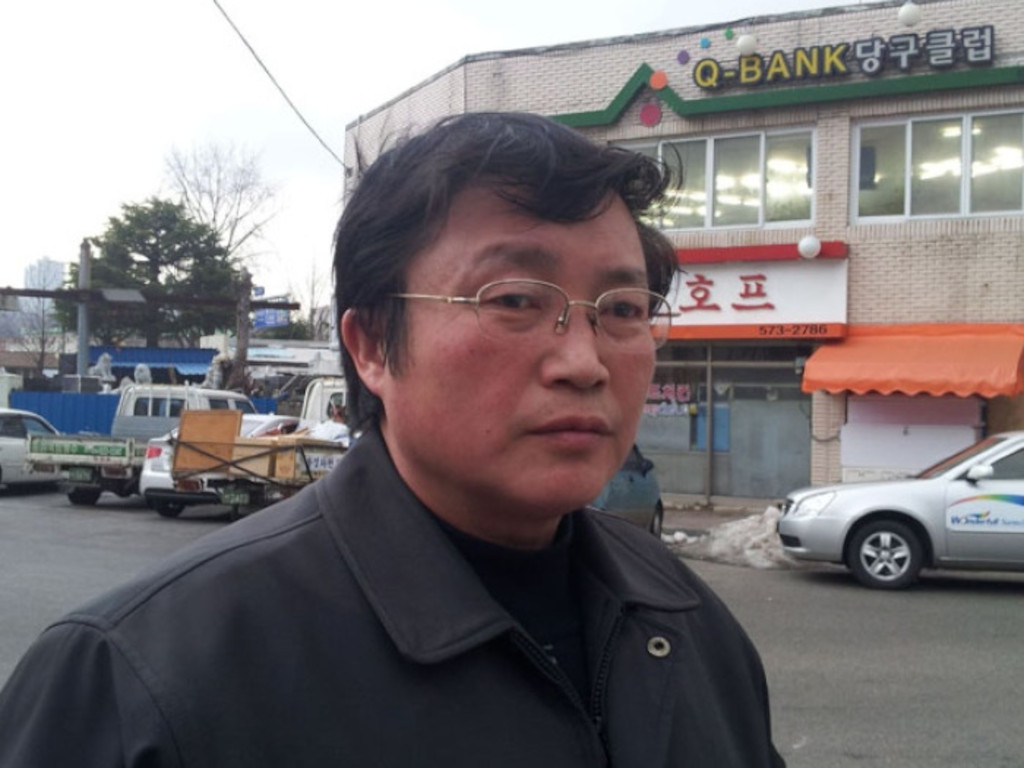
“And then we have what they call 'field learning'. For the biological and chemical warfare tests, we needed 'objects',” he added. “At first, they used the chemical agents on mice and showed us how they died. Then we watched the instructors carrying out the tests on humans to show us how a person dies. I saw it with my own eyes.”.
He said he got repulsed by what he had witnessed and managed to get over the border into China and arrived in South Korea in the mid-1990s. Now 50 years old, I'm is a prominent advocate of the regime change in Pyongyang and president of both the Soldiers' Alliance for Free North Korea and The Fellowship Foundation for Freedom. There are too many of these stories now for them not to be true,” Toshimitsu Shigemura, a professor at Tokyo's Waseda University, and an authority on North Korean affairs “There were reports in the past, but it was difficult to confirm them, but the testimony that is emerging now is consistent and from numerous sources,” he added.
“Anyone who goes to Pyongyang will notice that there are no disabled people about at all,” he said. “We now know that they are being taken away as children and incarcerated in special camps. The regime does this because it insists to their people that North Korea is heaven on Earth, and there can be no disabled people in paradise”.
According to Im, experiments on humans date back to the late 1960s and one of the first facilities used for chemical and biological weapons tests on humans was constructed on the military controlled island of Mayang-do, just off the east coast port of Sinpo, which is also North Korea's most important submarine base. A second facility was subsequently constructed on an island off the west coast of the peninsula, while a third is in operation alongside a political prison camp outside the city of Hyanghari, the defector claims. "They use anthrax bacterium as well as 40 different types of chemical weapons that the regime has developed itself,” Im said.
Nuclear Program
The North Korean nuclear program can roughly be divided into four phases. Phase I (1956–80) dealt primarily with training and gaining basic knowledge. Phase II (1980–94) covers the growth and eventual suspension of North Korea's domestic plutonium production program. Phase III (1994–2002) covers the period of the "freeze" on North Korea's plutonium program (though North Korea pursued uranium enrichment in secret) and Phase IV (2002–present) covers the current period of renewed nuclear activities.
Nyongbyon
The Nyongbyon Nuclear Scientific Research Center is North Korea's major nuclear facility, operating its first nuclear reactors. It is located in Nyongbyon County in North Pyongan Province, about 100 km north of Pyongyang. The center produced the fissile material for North Korea's six nuclear weapon tests from 2006 to 2017, and since 2009 is developing indigenous light water reactor nuclear power station technology.
The reactor designs were based on declassified information about the British Magnox design at Calder Hall and elsewhere, and the spent fuel reprocessing plant on the multi-national European Company for the Chemical Processing of Irradiated Fuels (EUROCHEMIC) plant at Mol-Dessel in Belgium. Another 200 MWe Magnox full-scale power reactor was being constructed at Taechon, 20 km north-west of Nyongbyon, (39.928°N 125.569°E).
Hermit Kingdom
The term hermit kingdom is an epithet used to refer to any country, organisation or society that willfully walls itself off, either metaphorically or physically, from the rest of the world. North Korea is commonly regarded as a prime example of a hermit kingdom. Today, the term is often applied to North Korea in news and social media, and in 2009, it was used by Hillary Clinton, then the United States Secretary of State.
A man who smuggled copies of smash hit South Korean Netflix series “Squid Game” into North Korea has been sentenced to death, after authorities caught high school students watching the show, according to Radio Free Asia (RFA). U.S.-headquartered independent news agency RFA reported, quoting sources, that the series was smuggled in from China on USB flash drives and that the smuggler faces death by firing squad.
“A student who bought a drive received a life sentence, while six others who watched the show have been sentenced to five years hard labor, and teachers and school administrators have been fired and face banishment to work in remote mines”
In December 2020, North Korea passed the “Elimination of Reactionary Thought and Culture” act, which prohibits the entry and dissemination of cultural material like films, plays, music and books in the country. The act is mainly aimed at preventing the spread of media from South Korea and the U.S. and those found distributing or consuming these are liable to be punished. According to widespread reports, in April this year a man was publicly executed for selling drives and CDs containing South Korean material.
“Squid Game,” in particular, has been a source of anger in the dictatorship. North Korean propaganda site Arirang Meari excoriated the high-concept survival drama as depicting the “sad reality of a beastly South Korean society.” The RFA report suggests that there is great public anxiety over the fate of the high school students and that more people could be implicated in the investigation.
Religion
In ancient times, most Koreans believed in their indigenous religion socially guided by mu (shamans). Buddhism was introduced from the Chinese Former Qin state in 372 to the northern Korean state of Goguryeo, and developed into distinctive Korean forms. In present day North Korea there are no known official statistics of religions in North Korea. Officially, North Korea is an atheist state, although its constitution guarantees free exercise of religion, provided that religious practice does not introduce foreign forces, harm the state, or harm the existing social order.
Kim Il Sung stated that Koreans in the north focused on rebuilding the country rather than churches, and additionally that the younger generation simply did not believe paradise could be obtained through worship and simply chose not to embrace religion.
Religion was attacked in the ensuing years as an obstacle to the construction of communism, and many people abandoned their former religions in order to conform to the new reality. On the basis of accounts from the Korean War as well as information from defectors, an interpretation has held that the North Korea was the second country (after Albania) to have completely eradicated religion by the 1960s. Other interpretations have thought that they do represent genuine faith communities that survived the persecutions. An interpretation has considered that these religious communities may have been believers who genuinely adhered to Marxism–Leninism and the leadership of Kim Il-sung, thus ensuring their survival.
“Contrary to the common western view, it appears that North Korean leaders exhibited toleration to Christians who were supportive of Kim Il-sung and his version of socialism. Presbyterian minister Gang Ryang Uk served as vice president of the DPRK from 1972 until his death in 1982, and Kim Chang Jun, an ordained Methodist minister, became vice chairman of the Supreme People's Assembly. They were buried in the exalted Patriots' Cemetery, and many other church leaders received national honors and medals. It appears that the government allowed the house churches in recognition of the Christians' contribution to the building of the socialist nation.”.
This interpretation has been supported by recent evidence gathered that has shown that the North Korean government may have tolerated the existence of up to 200 pro-communist Christian congregations during the 1960s, and by the fact that several high-ranking people in the government were Christians and they were buried with high honours (for instance Kang Yang Wook was a Presbyterian minister who served as vice president of North Korea from 1972 to 1982, and Kim Chang Jun was a Methodist minister who served as vice chairman of the Supreme People's Assembly).
Christian aid groups, including the American Friends Service Committee, the Mennonite Central Committee, the Eugene Bell Foundation, and World Vision, are able to operate in the country, but not allowed to proselytise.
Before 1948, Pyongyang was an important Christian center: The city was known as the "Jerusalem of the East". Many Korean Communists came from a Christian background; Kim Il-sung's mother, Kang Pan-sok, was a Presbyterian deaconess. North Korean Christians are officially represented by the Korean Christian Federation, a state-controlled body responsible for contacts with churches and governments abroad. In Pyongyang there are five church buildings: the Catholic Changchung Cathedral, three Protestant churches inaugurated in 1988 in the presence of South Korean church officials, and a Russian Orthodox church consecrated in 2006.
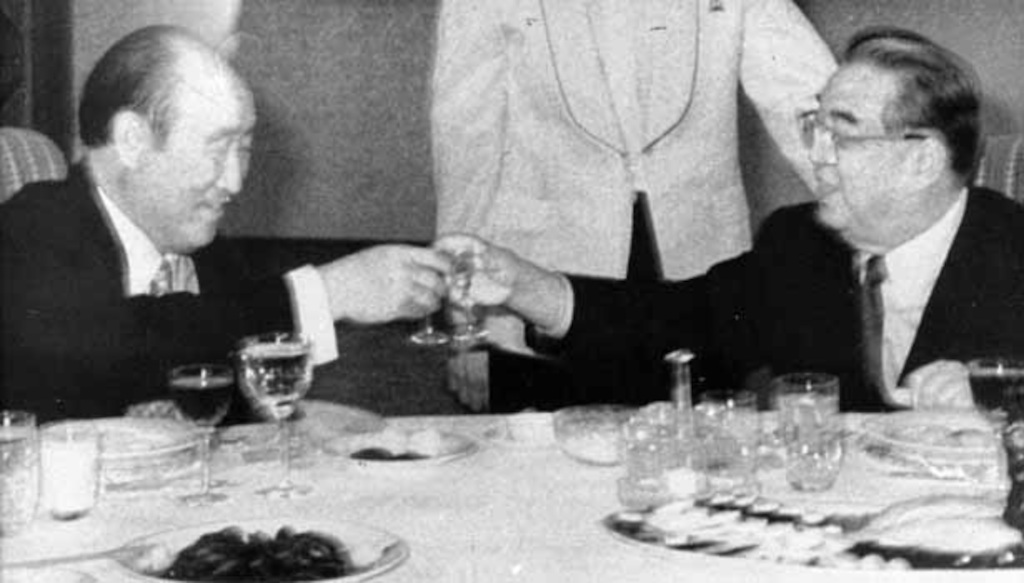
North Koreans, by Western definitions, would be considered non-religious but Buddhist and Confucian traditions still play a part in North Korean life. The Pew Research Center estimated that there were 3,000 Muslims in North Korea in 2010, an increase from the 1,000 Muslims in 1990. There is a mosque in the Iranian embassy in Pyongyang called Ar-Rahman Mosque, the only mosque in the country. The mosque was likely built for the embassy staff, but visits by other foreigners are deemed possible, too.
Propaganda
Propaganda in North Korea is controlled mainly by the Propaganda and Agitation Department of the Workers' Party of Korea. is a department of the Central Committee of the Workers' Party of Korea (WPK) tasked with coordinating the creation and dissemination of propaganda in North Korea. It is the highest propaganda organisation in the country. The history of the department can be traced back to the Soviet Civil Administration following the division of Korea in 1945. Agitation operations by the department reached their height in the years after the Korean War. Although nominally under the Central Committee of the WPK, the department reports directly to Supreme Leader Kim Jong Un.
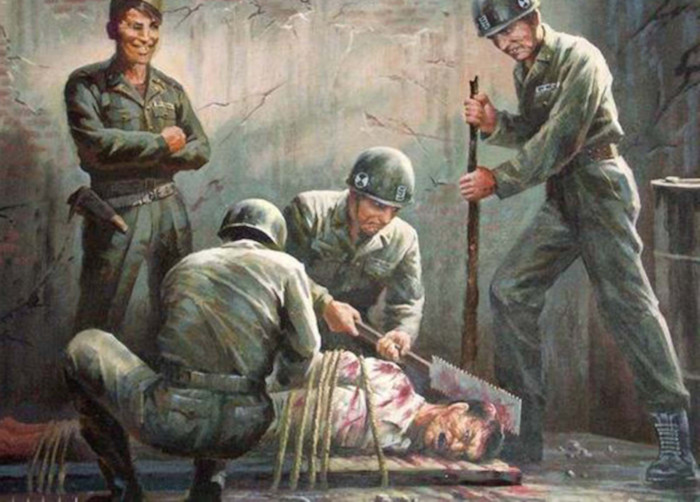
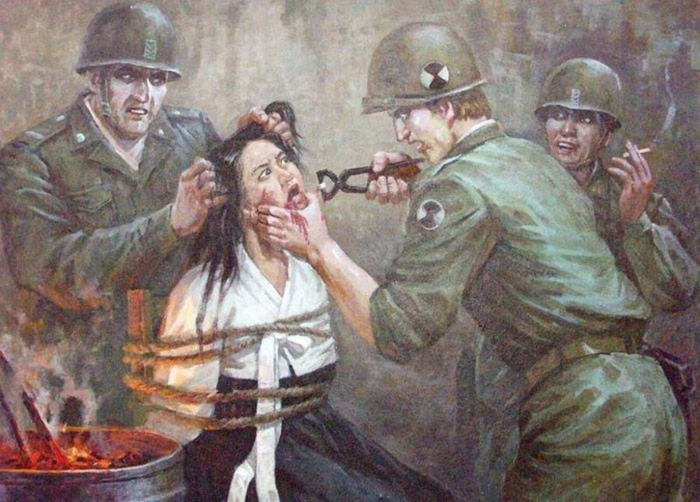
Propaganda paintings show how North Korea views America and by association the West. They depict the alleged mass murder of Sinchon civilians between October and December 1950. The regime claims that around 35,000 people were brutally tortured and killed by US forces during that time.
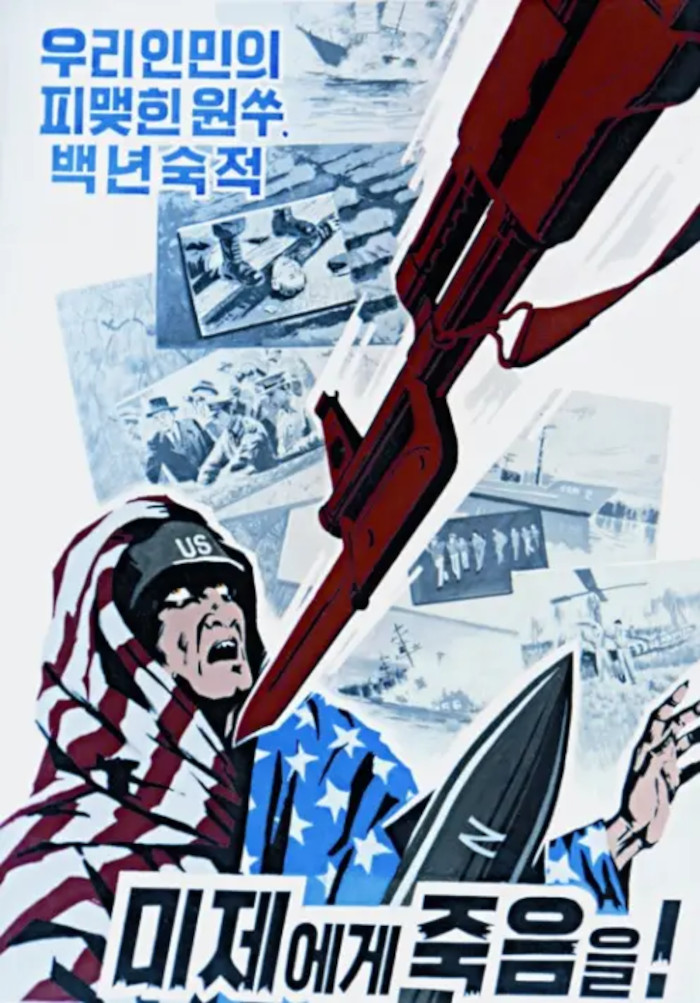
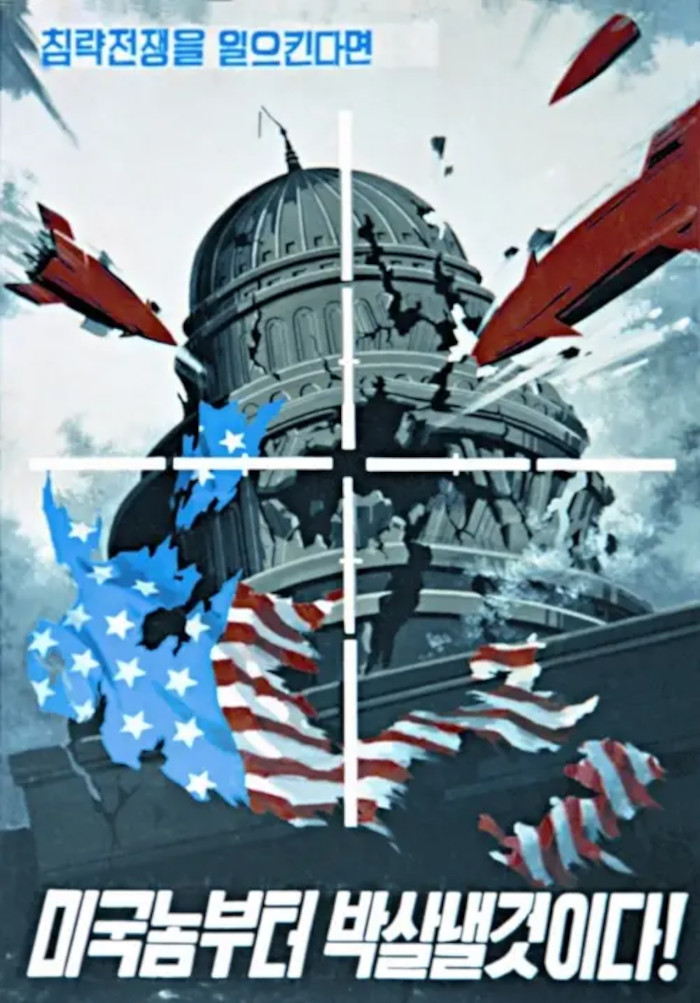
The department is currently under the effective guidance of its deputy department director Kim Yo-jong, sister of Kim Jong Un, while its nominal head is Ri Il-hwan. The department has various bureaus and offices under its control. The department sets guidelines for all propaganda materials produced and all North Korean media is overseen by it. However, in order to maintain its clandestine nature, actions relating to repression of the media are nominally attributed to the Ministry of Culture. When newspapers are published in North Korea, they go through three rounds of censorship. The first is handled by the editors of the paper. The second and third levels are taken care of by the department. The department also translates foreign works, which are censored from the public, for the use of the country's political elite.
The country's supreme leaders have had hymns dedicated to them that served as their signature tune and were repetitively broadcast by the state media:
- "Song of General Kim Il Sung" (for Kim Il Sung). a North Korean marching song composed by Kim Won-gyun in 1946. As a part of an ongoing cult of personality, the song praising Kim Il Sung, North Korea's "Eternal President", who died in 1994, is still widely played in the country. It is often considered to be the de facto national anthem in North Korea. Emulating a Buddhist tradition of carving sutras, its lyrics are carved in stones as well as the Pyongyang Arch of Triumph. The song is played by the North Korean state television and Voice of Korea at the start of broadcasts each day.
- "Song of General Kim Jong Il" and "No Motherland Without You" (for Kim Jong Il). The song praises the "Eternal General Secretary", Kim Jong Il (who ruled from 1994 until 2011) as a part of his cult of personality. During the presidency of Kim Il Sung, Kim Jong Il helped to run his father's own personality cult. Although the "Song of General Kim Jong Il" is not as widely popular as the "Song of General Kim Il Sung" (nor was his cult as large as his father's), it is also played regularly in North Korea. According to North Korean sources, their satellite Kwangmyŏngsŏng-2, supposedly launched in a test on 5 April 2009, is broadcasting this song amongst other data.
- "Footsteps", "Onwards Toward the Final Victory" and "We Will Follow You Only" (for Kim Jong Un). A Kim Jong Un propaganda song that appeared before "Onwards Toward the Final Victory". The song was released in 2009 and aired while his father (Kim Jong Il) was alive, before Kim Jong Un had a formal position.
Every year, a state-owned publishing house releases several cartoons, many of which are smuggled across the Chinese border and, sometimes, end up in university libraries in the United States. The books are designed to instill the Juche philosophy of Kim Il Sung (the "father" of North Korea)—radical self-reliance of the state. The plots mostly feature scheming capitalists from the United States and Japan who create dilemmas for naïve North Korean characters.
Dark Tourism
In principle, any person is allowed to travel to North Korea; only South Koreans and journalists are routinely denied, although there have been some exceptions for journalists. For instance, Croatian journalists had special access in June 2012, although their phones were confiscated and returned as they departed and they had a special tour guide. Travel agents can help potential visitors through the bureaucratic process. A tourist visa typically comes in the form of a blue travel paper stating "tourist card" and bearing the country's official name (Democratic People's Republic of Korea) in English and Korean, which is stamped by North Korean customs instead of the passport.
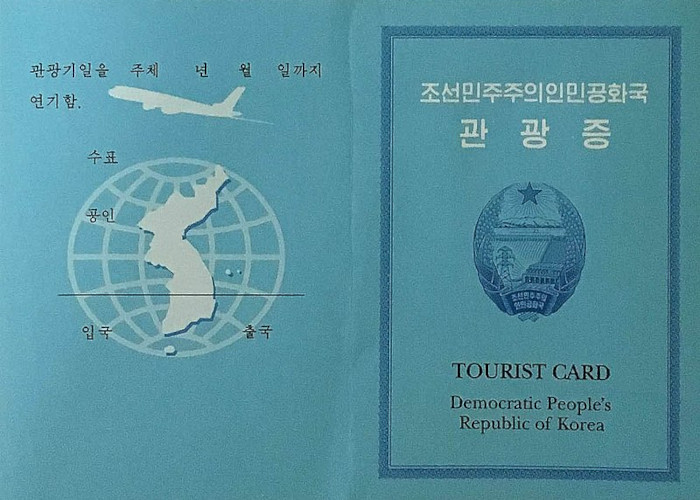
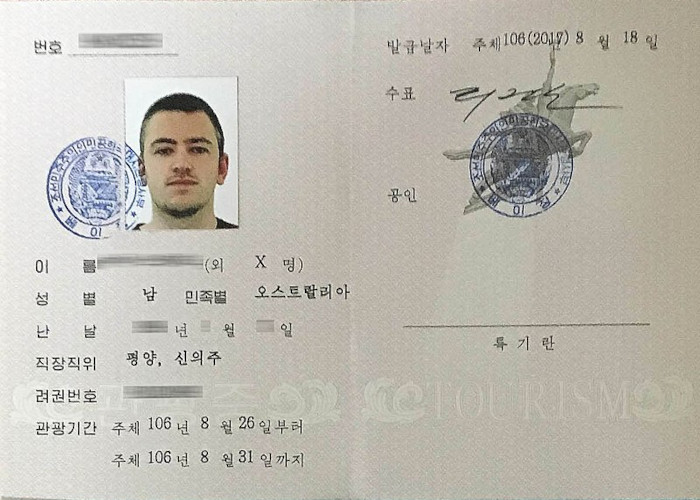
For Westerners, there are a small number of private tour operators that help provide access to North Korea. These include Koryo Tours (known for its North Korean-related films such as Comrade Kim Goes Flying and strong history in the region); Uri Tours (known for its role in Eric Schmidt's and Dennis Rodman's trips to North Korea); Lupine Travel (a UK-based budget travel agency known for its DPRK Amateur Golf Open); Rocky Road Travel (a Berlin based company); Juche Travel Services (a UK-based company); and KTG (known for their small sized groups and affordable tours). FarRail Tours also takes tours to see operating steam railways and the Pyongyang Metro.
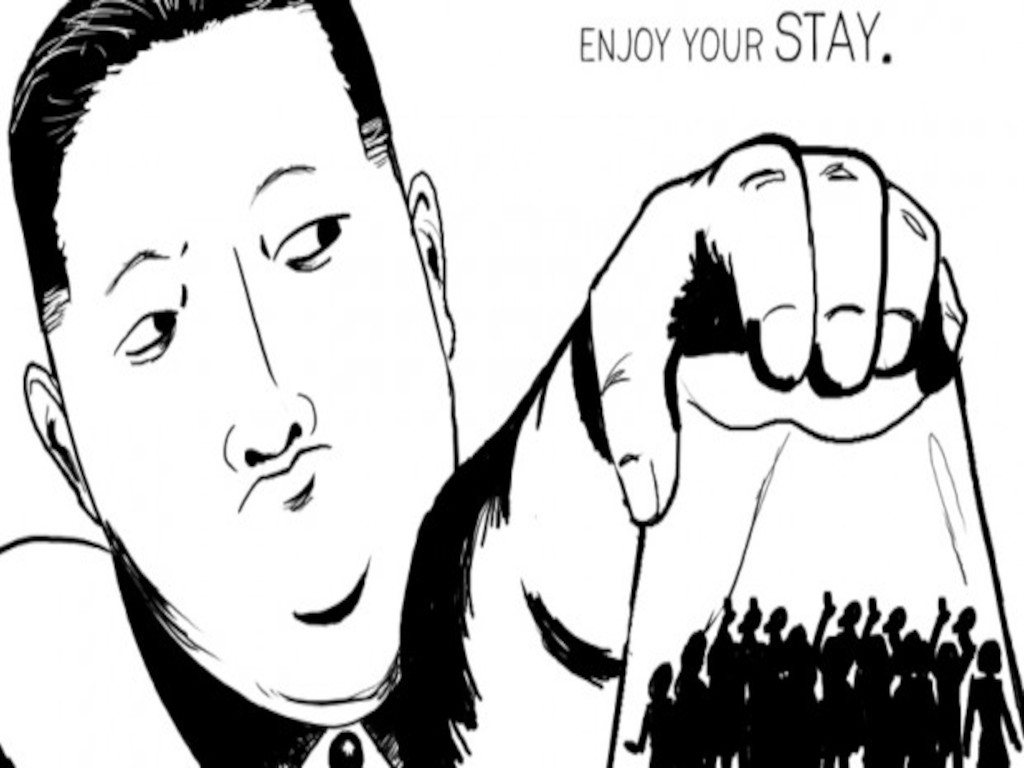
State General Bureau of Tourist Guidance (formerly State General Bureau of Tourism) is a North Korean state agency that organises tourism in North Korea. Foreign tour operators have to work closely with the bureau; its staff accompanies all tours of foreigners. The bureau was founded on 15 May 1986. It was renamed State General Bureau of Tourist Guidance in January 1990. It is based in the Central District of Pyongyang. Its president is Ryo Sung-chol. State General Bureau of Tourist Guidance has been a member of the World Tourism Organisation since September 1987 and the Pacific Asia Travel Association since April 1995.
By and large, the North Korean tourism industry is overseen by Room 39, the organisation in charge of North Korea's slush funds. Room 39 guides the State General Bureau of Tourism, which in turn "manages the earnings and maintains surveillance over the tourists, ensuring they are contained within specifically designated areas.". Room 39 oversees many of the government's illegal activities (although the military also has its own illegal activity division) such as counterfeiting and drug production. In 2010, the department was reported to have had 17 overseas branches, 100 trading companies and banks under its control. By 2009, the office allegedly had upwards of $5 billion in assets, much of which was spread in banks throughout Macau, Hong Kong, and Europe.
Troy Collings
Troy Michael Collings was a New Zealand businessman and tour guide. In 2008, he co-founded Young Pioneer Tours, a company known for specialising in low-cost tours of North Korea and other remote places. Collings became interested in North Korea after watching the 2004 documentary A State of Mind about North Korean gymnasts training for the 2003 Pyongyang Arirang Mass Games. He later went on a research tour to the country. Collings was an advocate for North Korean tourism. He is quoted as saying that North Korea is open to everyone except South Koreans and journalists. He helped open the Tumen-Namyang border between China and North Korea to foreign tourists. He was the first westerner to travel across the Tumen-Namyang border, when he led a tour group across the border in 2013. In 2012, he launched the Pyongyang Deaf and Blind Centre charity.
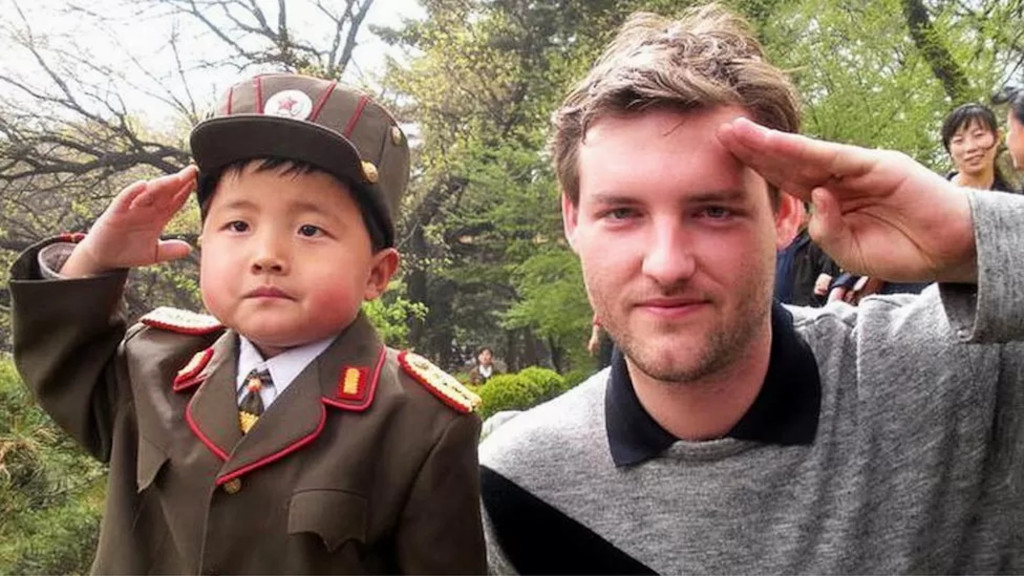
In 2015, Collings confirmed the reopening of the North Korean border after an ebola scare. In the same year, he spoke about North Korean citizens having an ever-increasing choice of food at the Kwangbok Department Store in Pyongyang. In 2017, he was quoted as saying that hemp was as cheap as tobacco in North Korea. In 2017, Young Pioneer Tours were criticised after the death of Otto Warmbier, who was on a tour with the company. Warmbier was sentenced to 15 years on a charge of subversion and died in 2017. After Warmbier's death, Collings maintained that North Korea was a "safe place to visit", as Warmbier was the first person on a Young Pioneer Tour to be arrested. He maintained that North Korea was safe as long as local laws were adhered to, and also refuted claims that Young Pioneer tours targeted Americans, saying that none of their advertising had focused on Americans.
On 5 March 2020, it was announced that he had recently died of a heart attack at the age of 33.
Evan Hunziker
Evan Carl Hunziker was the first American civilian to be arrested by North Korea on espionage charges since the end of the Korean War. On August 24, 1996, Hunziker was taken into custody by North Korean police after swimming into the country across the Yalu River from the People's Republic of China. Hunziker spent three months in North Korean custody before being released and returned to the United States thanks to the negotiation efforts of then-New Mexico congressman Bill Richardson. However, less than a month after his return, Hunziker killed himself.
The North Korean government did not announce Hunziker's arrest until October 6, and analysts suspected they delayed the announcement until a more strategic time in an attempt to divert attention from two other international controversies: one regarding the unsolved murder of South Korean consul for the Russian Far East, Choe Deok-geun, in which North Korean involvement was suspected, and the other about the landing on South Korean soil of a North Korean submarine containing 26 commandos. On October 8, the North Korean government formally announced that they would charge Hunziker with espionage, a charge which could bring the death penalty.
Matthew Miller
Matthew Todd Miller is an American citizen who was detained in North Korea (DPRK). He had travelled to North Korea intending to get arrested. He was sentenced to six years of hard labor on September 14, 2014, for committing "acts hostile to the DPRK while entering under the guise of a tourist." He was released, along with Kenneth Bae, on November 8, 2014. According to North Korean state-run media, Miller entered North Korea alone on April 10, 2014, on a tourist visa arranged by US-based tour operator Uri Tours. Initial reports said that he tore up the visa upon arrival at the airport and declared his intent to seek political asylum. He was arrested for "unruly behaviour".
Miller was charged under Article 64 of the North Korean criminal code concerning acts of espionage, and was put on trial on September 14, 2014. He was swiftly convicted and sentenced to six years of hard labor (euphemistically termed "labor re-education") for committing "hostile acts". Miller had no lawyer during the 90-minute hearing, described as a "show trial" by The Washington Post, and authorities indicated that there was no possibility of appeal. Although earlier reports indicated that Miller sought political asylum in North Korea, the prosecution argued that this was a ruse intended to disguise Miller's real intention of committing espionage. According to the court, Miller admitted to having the "wild ambition" of experiencing conditions in prison to secretly investigate and expose the country's dim human rights situation.
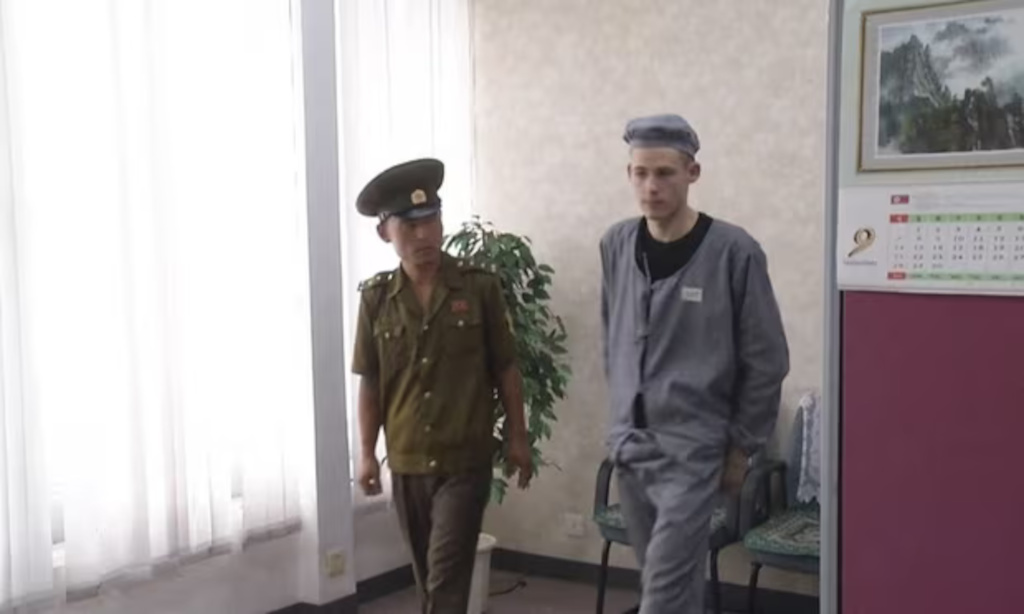
After returning to the U.S., Miller told reporters he went to North Korea intending to get arrested, stating that "My main fear was that they would not arrest me when I arrived". Initially North Korean authorities had refused to arrest him and sought to return him on the next flight, but Miller refused. Miller had brought a notebook into North Korea incorrectly claiming he was a computer hacker involved with WikiLeaks and having attempted to access files at U.S. military bases in South Korea. He later assessed that this material was never taken seriously by the North Korean authorities, prompting them to ask him the real reasons behind his visit.
Conclusion
Multi-generation trauma mind-controlled slaves, debased and detached from the real world of family, friends, emotion, nurture, and love; stranded, knowing nothing besides being “threaded” through forced labour manifested by the cruellest form of Communist collectivisation. How much more evil does this brainwashing get? is this what is secretly being used, in a much more open environment, more subtle, less confined approach but equally terrorising (for some) within a subordinate western world? Is the forensic footprint of this most grotesque crime against humanity present in our world, slowly eroding, distorting cognition enough to void our conceptual reality.
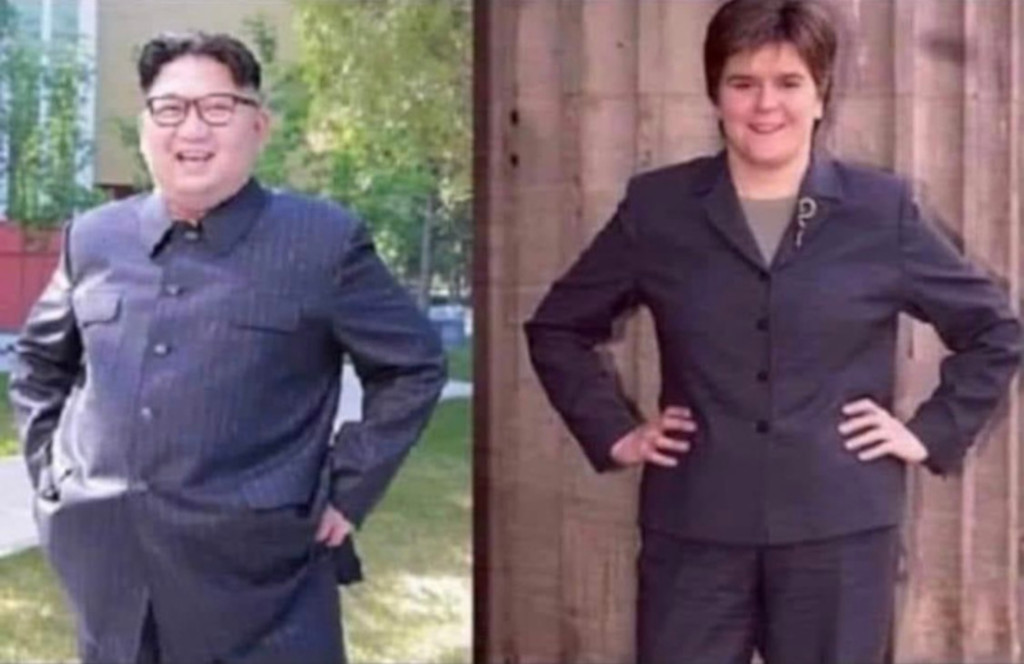
“Although Leninist socialism tried to deposit this regime they still invited the personality cult tyrant of a zombified North Korea, an unholy ghost of Stalinist brutality, delivered unto mediumship table of deliberating consensus.”.
Think a slow burn, near-invisible projection, slipstreaming through compartmentalisations, defacing awareness, a co-opted consciousness steered and triggered by anxieties, laid dormant by depression and subjugated by fear invoking narratives, micro-traumas pre-programmed from horror movies that are being screened to us twenty-four seven. Everywhere we look we see an agenda, rising in plain sight as if we are seeing the face of a clock without ever being aware of the mechanism behind it. Humanity has never been so automated, machinated into compliance as it is today; but to what end, where is this march of the living dead going? Inescapable slavery, eternal servitude?